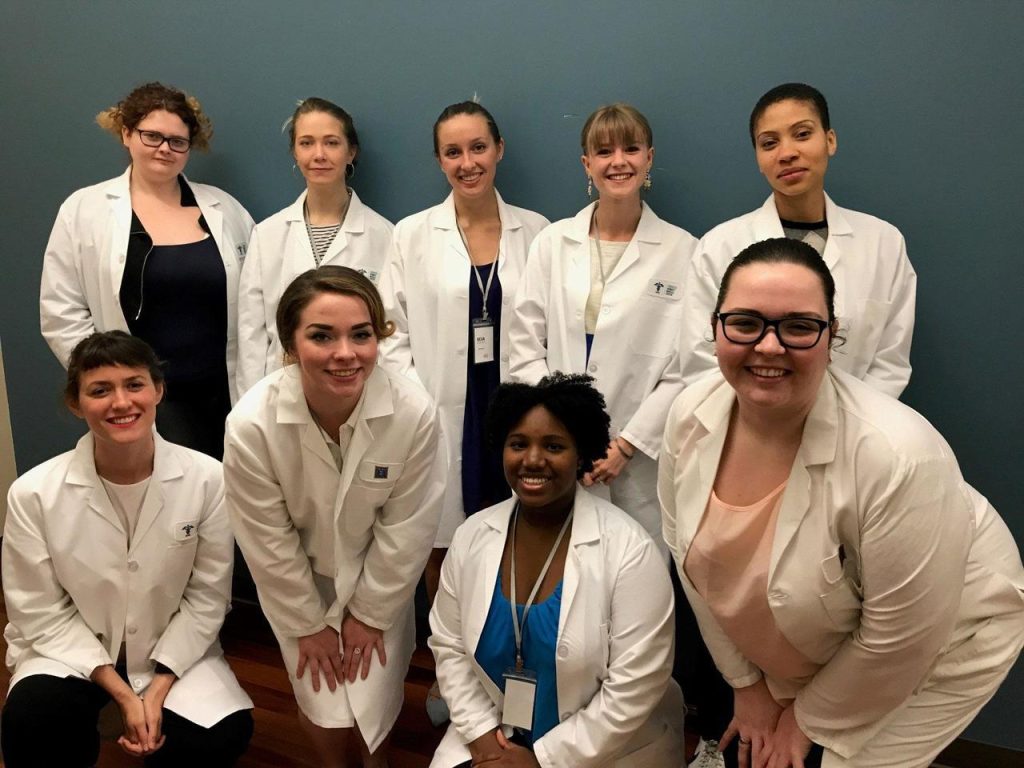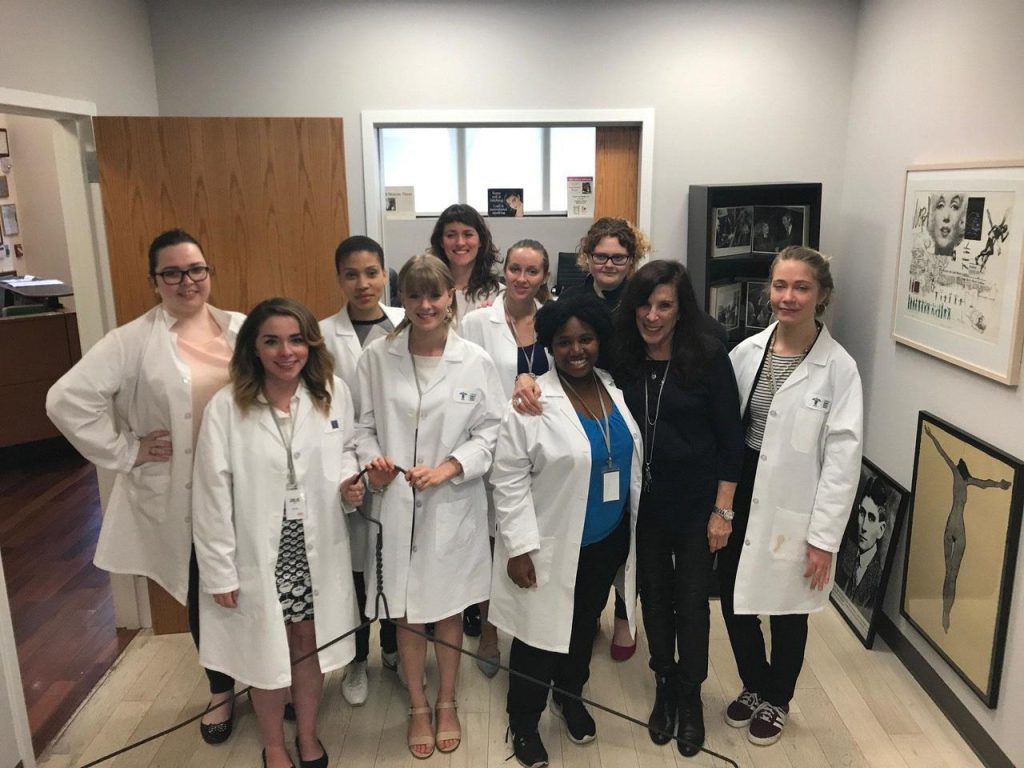
Following are three interviews with medical students who recently spent internships at CHOICES. To ensure privacy, their full names have not been used.

Emma
“I saw at CHOICES what could be – needs to be – everywhere.”
Growing up in Texas, Emma said she had always been surrounded by abortion restrictions. She came from a family where women had had personal experiences with abortion, both when it was illegal before the Supreme Court’s Roe v. Wade decision in 1973, when women had procedures with no pain control and great fear they would not survive, and after Roe when it became legal nationwide. “Now, after the Dobbs decision, women again have to fear becoming pregnant,” she said,
“Being at CHOICES showed me concretely what the difference is between having legal, accessible abortion and having to live with that fear of becoming pregnant if you don’t want to be, or can’t continue the pregnancy, “she said.
Many medical schools do not provide training in abortion procedures. As a resident in Family Medicine in Texas, and having gone to medical school there, Emma said she saw what “a huge disservice it means for patients if you don’t learn about abortion.” She reached out to Medical Students for Choice, found Choices Women’s Medical Center, and was awarded a 2-week stipend for her internship..
(Medical Students for Choice, https://msfc.org/, is a national organization whose mission is “to support future abortion care providers and advocate for reproductive justice globally.” Choices Women’s Medical Center supports and works with them in this mission.)
Emma was attracted to CHOICES because New York State has no restrictive abortion laws and she wanted clinical experience with doctors trained and specializing in the procedures. She was also drawn to CHOICES because of Merle Hoffman’s history in founding it and expanding its care to full OB-GYN services.
She was impressed that CHOICES is “not only an abortion clinic” but offers comprehensive gynecological and prenatal services which, she feels strongly, “every medical facility in the country should have – from full counseling services through birth control and prenatal. Medical providers should be patient-centered, and that means offering a full range of services.”
At CHOICES, Emma assisted with offering patients different methods of birth control. She observed counseling sessions led by CHOICES’ Licensed Social Workers and saw patients who decided to keep their pregnancies and begin prenatal care, as well as those who had abortions.
Emma feels strongly that “every single woman should be able to make that decision in a timely manner. CHOICES’ clinic offers every choice. Coming from such a restrictive state, I didn’t realize there were full service clinics that offered comprehensive GYN care.” She also is very conscious of disparities in the quality of reproductive medical care available to women of color and diverse nationalities and appreciates CHOICES’ efforts to be inclusive and offer care to everyone needing it.
In conclusion, Emma said she would encourage students from her school to come to CHOICES for training. Even students who are not intending to provide abortion services need to learn about this, she said. ”By not learning this, students are deprived of valuable knowledge about patient care that can assist doctors in their other work and help patients who may need abortions. It’s valuable to have broad options during Externships so students can see what is available out-of-state for women who need that care.
“I saw so many patients being helped at CHOICES – people from various backgrounds, many already mothers who are just trying to care for their families. I am heartbroken going back to Texas because now I know what services could be offered – and what is not being provided. I think I’ve been radicalized by what I’ve seen and am even more committed to this work.”

Lindye
“I really couldn’t believe how much I was able to teach other students from what I learned at CHOICES.”
Lindye self-identified as a feminist and supporter of reproductive rights before she began studying women’s health in medical school. It was there, however, directly working with patients on reproductive health issues, seeing the immediate impact she could have on them and their gratitude toward providers, that she understood the actual possibilities of changing people’s lives through her work.
She began searching for independent abortion clinics for possible internships. Looking for clinics that saw patients from other states, she mentioned her search to friends in NYC. She found CHOICES and was impressed it had a full surgical center – “it wasn’t limited to what I knew as in-office procedures done in early pregnancies. I wanted to observe and learn from doctors who did later-term procedures.”
“I also learned a lot by observing counseling sessions with patients. My main takeaway from counseling is that before coming to CHOICES I had not seen patients who were basically undecided about what they wanted to do before coming in. I learned that counseling is a way to educate patients – after speaking to counselors, speaking about their values and the different choices they had, it does happen that patients opt out, that does happen. Counseling is intended to inform you so you can make an informed choice on your own. So that was interesting to me because it is the opposite stereotype of abortion providers making people do what the counselors, the clinic wants. Rather it’s the way to help patients make more informed choices.”
“Another takeaway is the remarkable diversity of the patients who come for services, including abortion procedures. I met out-of-town patients, older as well as quite young patients, with many different backgrounds. Many had children. A great diversity of people, every day – there is definitely no one accurate stereotype of an abortion patient.
“I’ll definitely tell other med students that if anyone is interested in family planning but doesn’t have access to it, look for a chapter of Medical Students for Choice. They support med students who are interested. You may have to search for it, and it’s probably not going to be told by your school. I was able to get school credit for the 4-week externship. You can find people who want to support you. My experience at CHOICES was fulfilling and meaningful and helped solidify what I want to do in life.”
She concluded: “I really couldn’t believe how much I was able to teach fellow students from what I learned at CHOICES. I’m so grateful to all of you that I was able to pass the knowledge forward and encourage more of our students to apply for externships at out-of-state abortion clinics!”

Betty
“It is one thing to talk about medical treatment and issues. It’s another to hear stories from the patients themselves“
Before beginning Medical School at Johns Hopkins, Betty was a 7th grade chemistry teacher. She wanted to go into medicine and considered specializing in pediatrics. She did medical school Rotations at different locations in different fields. But it was the Supreme Court’s Dobbs ruling overturning Roe that was key in her decision to focus on women’s health.
Reflecting on the situation after Dobbs and the huge problems it was creating in many states and for so many women, I came to realize I was most interested in women’s health,” Betty said. “Dealing with gynecological issues during Rotation, I saw how pregnancy affects so much of a person’s overall health, and it’s important to have options. Treatment could be different if a person has chosen to terminate a pregnancy. Perhaps medication would be different. All of this needs to be considered.”
“My decision to go into Women’s Health was a process. I found out about CHOICES through the Medical Students for Choice Externship Program, and I wanted to work in the NYC area.”
Was there anything in particular that impressed you about CHOICES?
“CHOICES is unique in serving such a diverse patient population across different cultures. It offers translation services through an interpreter who might be someone on the staff. Also, I was impressed by all the services that are provided here, under one roof. GYN services are in one area, surgical procedures are in another one, social workers another.
Everything is in this one building, which means that patients have continuity in their care. – they can talk to a social worker right here to plan their next steps, etc. Sometimes medical care can be very separate and disjointed. Here everything is in one location, people really get good services.
For example, a woman came in for a medical abortion and brought her young son. It turned out she was a little past the gestational age for a medical abortion. She wanted to schedule a surgical abortion, but she had no one to take care of her son. She spoke with a social worker here who immediately picked up the phone and began calling agencies CHOICES works with, looking for a babysitter. They found one and were able to schedule her for a day or two later when the babysitter was available. I was so glad we were able to tell her that she could come back, get her procedure, and her son would be taken care of.”
Could you say more about the diversity you found at CHOICES?
“As someone who cares about the situation with underserved populations, I’m impressed with how CHOICES serves patients from all around the world and provides an interpreter or someone on the staff who speaks their language. My family is from Ethiopia and my parents speak Amharic, so I have a first-hand appreciation of the importance of communication and how difficult it can be. I see how CHOICES really cares for immigrant populations.
I think the totality of who CHOICES serves is remarkable, Bengali, Spanish, Haitian Creole, and more. And getting the same message across in each language. So many other people will get inadequate care, certainly in the medical field it’s a common immigrant experience. As someone who interacts with immigrants every day, I have seen how a language barrier can impact the care you receive.
Every day CHOICES sees dozens of people for GYN care, including medical abortion – I see a great need for it, from all over NYC and out of town. This is a relatively dark time for reproductive health. My time here has shown me, firsthand, that with so many people seeking services; abortion restrictions will be a detriment and huge problem for women everywhere. All of this has strengthened my belief in women’s right to access abortion care.
I feel like I saw the whole spectrum of women’s reproductive care here. It was a very positive experience, and I encourage my peers to take part in experiences like this. It is one thing to talk about medical treatment and issues. It’s another to hear stories from the patients themselves.”

Serving Our Patients And Building The New Generation Of Abortion Providers
We hope you enjoy these interviews with three medical students who recently spent internships at Choices Women’s Medical Center. They will give you an idea of what CHOICES care means concretely for all our patients.
CHOICES has always been a prime learning center for college and university students, including medical students, as well as practicing physicians, who want to learn more about reproductive health care, and work with the most compassionate and highly skilled providers. Internships are available in many of our departments, including Gynecology, Counseling, Prenatal Care, and Abortion Service. We are pleased to announce that we are expanding our Internship and Training programs to better meet this need.
If you are interested in participating, we invite you to write to us, tell us about yourself and send your resume, and we will get back to you. If you are a medical school administrator or teaching professional interested in an ongoing relationship, please contact us. We are eager to work together to build the new generation of reproductive health and abortion providers.
Some schools and organizations that we have worked with in the past include Bela Abzug Leadership Institute (BALI), Columbia University, Duke University, Jamaica Hospital, York College, Queens College, Medical Students for Choice, and American Medical Opportunities Worldwide Intern Program (AMO).

